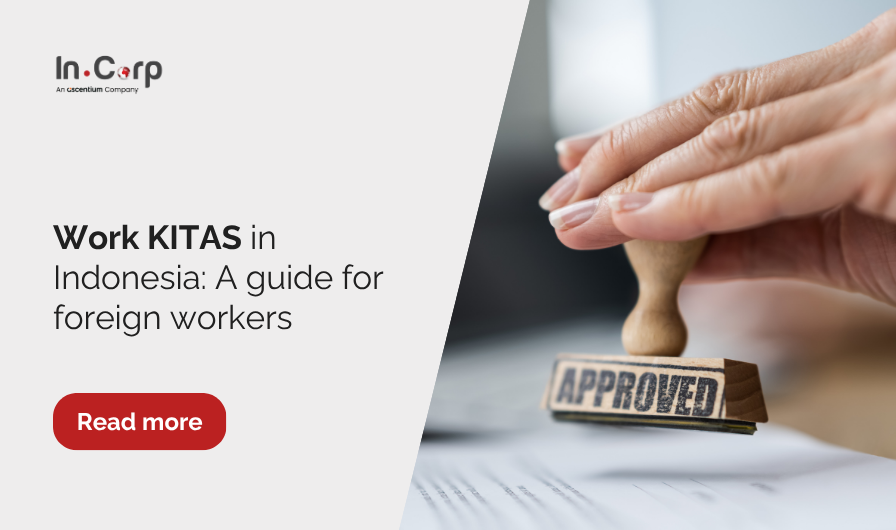Indonesia’s thriving economy attracts thousands of foreign workers each year. Whether you’re an executive or an entrepreneur, living and working in Indonesia legally requires a specific permit named Work KITAS (Kartu Izin Tinggal Terbatas).
KITAS is a permit that allows foreigners to live and work in Indonesia for one year, with the option to extend. This guide will help you gain a comprehensive understanding of the importance of KITAS Indonesia and the essential steps to obtain one, empowering you to navigate the process confidently.
What is KITAS in Indonesia?
KITAS, or Kartu Izin Tinggal Terbatas, is Indonesia’s Limited Stay Permit Card. It is a legal document allowing foreigners to stay in Indonesia for extended periods, typically 6 to 12 months, with the possibility of renewal.
The Work KITAS specifically enables lawful employment under an Indonesian company’s sponsorship.
Understanding Work KITAS in Indonesia
This KITAS is designed for foreign professionals employed by Indonesian companies. It’s mandatory for those intending to work in the country legally. This includes:
- Short-Term Work KITAS: Valid for up to 6 months, non-extendable. Ideal for consultants, project-based roles, and temporary specialists.
- Long-Term Work KITAS: This option, valid for 12 months and extendable yearly up to five times, is suited for executives, directors, senior managers, and technical experts. It provides a flexible solution for long-term employment in Indonesia.
To apply, foreigners must first secure a work permit (IMTA) and a sponsorship from an Indonesian entity.
How to apply for Work KITAS in Indonesia
Securing a Work KITAS in Indonesia is a systematic process that requires coordination between the foreign applicant, the sponsoring company, and several government institutions.
There are three main steps to applying for a Work KITAS in Indonesia, including:
- Obtain an IMTA (Izin Mempekerjakan Tenaga Asing): This work permit, issued by the Ministry of Manpower, allows a foreign worker to be employed in Indonesia.
- Company Sponsorship: The employer plays a crucial role in the application process. They are responsible for submitting the application and completing all required documents, including the RPTKA (Foreign Manpower Plan) and the IMTA (Work Permit).
- Apply for the Work KITAS: Once the IMTA is secured, the worker submits their online application to the Directorate General of Immigration to receive their Work KITAS.
Bringing Family to Indonesia with Dependent KITAS
Foreign workers holding a Work KITAS can bring their spouse and children under 17 to Indonesia with a dependent visa. This visa allows family members to stay legally but does not grant work authorization.
If a spouse wants to work, they must apply separately for a work permit or Work KITAS. Moreover, extended family members such as parents and siblings cannot be sponsored under this KITAS.
Key Considerations for Families
To ensure compliance and seamless application, you must consider these key points when applying for a Dependent KITAS.
- Spouse Employment: If the dependent spouse wishes to work, they must apply separately for a Work KITAS and secure sponsorship.
- Children Turning 18: Once a child reaches 18, they can no longer stay under a Dependent KITAS and must switch to an appropriate visa category.
- School Enrollment: Most international schools in Indonesia require a valid Dependent KITAS for admissions and student records.
Processing Time for Work KITAS and Dependent KITAS
Timing is everything when planning an international move. When you accept a new job offer or move your family, it is essential to know how long it takes to process a Work KITAS and a Dependent KITAS. This knowledge can help you avoid stress and logistical problems.
Here’s a detailed look at how long it typically takes to get your KITAS in Indonesia:
Work KITAS Timeline
The application for a Work KITAS involves multiple steps across different government departments. Typically, you can expect a few weeks to 1.5 months of obtaining the KITAS, with each estimated stage timeline below:
| Stage | Estimated Timeframe |
| RPTKA Approval (Foreign Manpower Plan) | 5 – 7 working days |
| IMTA Issuance | 7 – 10 working days |
| Telex Visa (Visa Approval Letter) | 3 – 5 working days |
| Embassy Visa Stamping | 3 – 7 working days |
| Conversion to KITAS | 10 – 14 working days |
| Local Police and Civil Registration (STM & SKTT) | 3 – 5 working days |
Dependent KITAS Timeline
The Dependent KITAS process is typically faster, taking around 14 working days once all required documents are submitted. The visa duration aligns with the primary Work KITAS. Each stage includes:
| Stage | Estimated Timeframe |
| Telex Visa Application | 3 – 5 working days |
| Embassy Visa Stamping | 3 – 7 working days |
| KITAS Conversion | 7 – 10 working days |
| Local Police and Civil Registration | 3 – 5 working days |
Tips for a smooth KITAS application
To make your KITAS application easy, start preparing at least two to three months before your move. Always double-check that all your documents are complete and match across passports, certificates, and company letters, ensuring a smooth and stress-free application process.
Being organized, starting early, and asking for professional help can save you time, money, and stress.
Seamlessly obtain a work KITAS in Indonesia with InCorp
Obtaining a Work KITAS in Indonesia may seem complex initially, but with proper preparation and understanding of the process, you can navigate it confidently
InCorp Indonesia (an Ascentium Company) offers end-to-end Work KITAS Indonesia services to save time, money, and frustration with the KITAS application, ensuring a hassle-free entry into Indonesia.
Please fill out the form below and get our support to focus on building your career in Indonesia.
Written by Setiyani Prabowo [CSR, Semarang]
Get in touch with us.
What you'll get
A prompt response to your inquiry
Knowledge for doing business from local experts
Ongoing support for your business
Disclaimer
The information is provided by PT. Cekindo Business International (“InCorp Indonesia/ we”) for general purpose only and we make no representations or warranties of any kind.
We do not act as an authorized government or non-government provider for official documents and services, which is issued by the Government of the Republic of Indonesia or its appointed officials. We do not promote any official government document or services of the Government of the Republic of Indonesia, including but not limited to, business identifiers, health and welfare assistance programs and benefits, unclaimed tax rebate, electronic travel visa and authorization, passports in this website.



